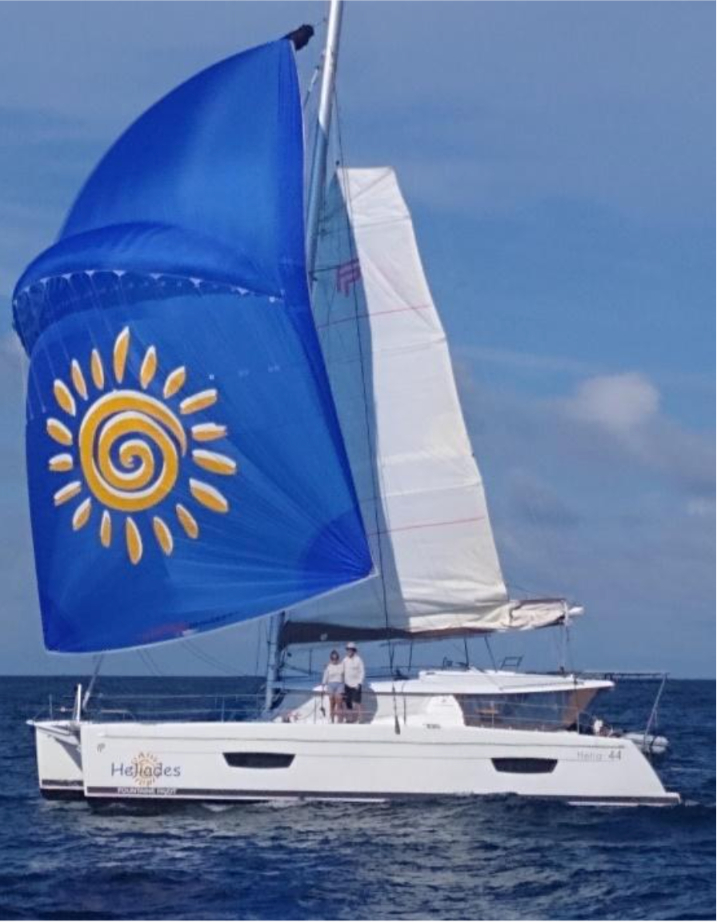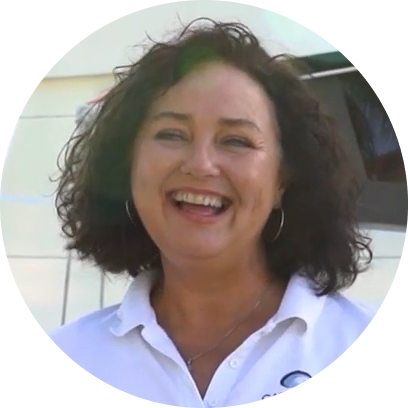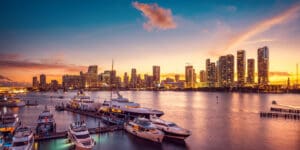At Catamaran Guru, we believe yacht ownership can be both a dream and a smart financial decision—when done right. Chris and Heidy Carstens are a shining example of what’s possible with our Boat as a Business Program. From exploring charter ownership to becoming full-time liveaboard cruisers, their story is one of thoughtful planning, hands-on learning, and true sailing adventure.
In this personal account, Chris shares the real-life steps they took to transform their retirement plan into a lifestyle afloat—complete with tax-savvy decisions, charted waters, and lessons learned along the way. Whether you’re dreaming of passive income, a long-term cruising plan, or just a smarter path to boat ownership, this story is a must-read.
I grew up sailing and windsurfing small boats on Lake Michigan and summer racing big boats out of Chicago. My career in the Oil & Gas industry found me living in various countries around the world. My sailing activities were limited to windsurfing and occasional charter sailing. Reading Cruising and Sailing Magazines my dream persisted to one day own my own sail boat and sail off…. into the sunset.
Towards the end of my career or as they say in corporate speak “near the end of my runway” I read an advertisement in one of the sailing magazines about “boating as a business”. I read about buying a boat, putting the boat with a charter company, making tons of money for several years and then finishing the charter business and taking over the boat for yourself. Sounds to good to be true – right? Ok slow down captain. I am an engineer, I like data, facts and I like to analyze carefully before making decisions especially when making a near million dollar purchase with my future retirement funds.
Our first stop was the Miami Boat Show. We met and spoke with brokers, manufacturers, and charter companies. I researched on internet forums – not necessarily a good place to gather real information. Most all internet forums posters will tell you “Don’t do it”, “your boat will get wrecked”, “it’s illegal”, “the IRS will disallow deduction”, only do it with a captain – never bareboat it” on and on. Most if not all of these responders have never owned a charter boat I would guess. I wanted to find owners who actually had experience with chartering their own vessel. I wanted to hear the good, the bad and the ugly. By chance having a conversation with Stephen Cockcroft with whom I was starting to build a relationship with, he mentioned if I happened to know a friend of his (and boat as a business client), working at the same company that I did. I did not – but I soon did and discovered that he had his boat in charter and was just about to close down his charter business and use his boat full time for himself. I was starting to get hooked on the idea. He shared with me his financials and other tips to have a boat in a successful charter program.
I wanted to learn about tax implications for running a boat as a business and verify what Stephen suggested I do. Someone had given me the name of an accounting agency in Miami that specialized in yacht and jet leasing LLC’s. He went over with me the things that the IRS would look at in order to show a legitimate business and not just as a tax deduction for me to use the boat for personal use. The CPA went over setting up an LLC, LLC Operating Agreement, Business Plan. Creating an LLC along with the other documents which were quite easy to DIY – there are many free examples on the internet.
He provided me with these tips for owners of charter yachts.
- Minimize personal use to a few weeks a year. Note there are ways to utilize the boat more legitimately such as maintenance and repair time, boat movement for hurricane season or base changing,
- Keep receipts and document all expenses.
- Track all income and expenses in a good ledger like QuickBooks or other accounting software
- Track your time for maintenance, repairs, time on the boat and bookkeeping work
- The need to show a profit for one or two years over the life of the LLC.
At one of the next boat shows we found that boat that “we” both liked. It is important to keep your spouse/partner involved in the whole process….in the end you both want a boat that you can enjoy in its after-work life!
Finding the right broker, charter company, and the boat is likely one of the trickiest equations to solve for the future boat as a business owner. The broker needs to be your partner in selection and closing on the boat until the warranty runs out many years later. Remember that with most major manufacturers the manufacturer only communicates with the broker – not the boat owner. So, during construction, selecting options, boat acceptance and until the warranty runs out virtually all communications with the factory will be through the broker. Often (kind of like real estate) your broker is your best friend until you sign the purchase contract. Get references from other owners and select your broker wisely.
The charter company may want a particular manufacturer, model, hull layout, and a base location to best suit their fleet operations. You, the owner, may want a particular make and layout of the boat, you must decide if you accept captain or crewed and what base to locate your new boat in. You need to assess the charter company to determine how they screen charterers and how they document and charge maintenance costs, repairs, insurance, base charges etc. and factor into your business plan. One of the most important things that you can do before selecting a charter company and base is to meet with the base operations manager. The most important question to ask is how they maintain and document all the maintenance and repair work. During the first years that our boat was in charter I decided to do some of the maintenance work myself and at times paid an outside the charter company, service techs to perform the work so that I had confirmed records of work being done. I think or hope charter companies are now getting better at performing and keeping a good record of maintenance service.

Maybe I was lucky or made good selections but we were happy with all three of our choices, the boat, the broker and the charter company. Not perfect, not without stress at times but in the end all three of us I believe were satisfied. Quick note; we selected an owners version catamaran. Why? Because we wanted this type of boat at the end of charter for outselves, we felt 8 guests on our size boat was overloading the common facilities i.e. more wear and tear and the future resale value would be better for a 3 cabin boat.
Charter Base – initially my broker recommended the USVI’s or BVI’s to place the boat. For some reason I was hesitant to put it with the hoards of charter fleets and charterers banging around in the VI’s. We looked around some more and selected Grenada. I am so happy we picked Grenada in the Windward Islands. The sailing down there is more “true” sailing, beam reach winds, deepwater sailing and I think most importantly attracted a higher experience level of sailors. Many Europeans come over to sail in the Windward and Leeward Islands which (IMO) were better trained and had more experience. All most all of your charters were bareboat. Which is normal for our 44’ size catamaran.
At the end of the 2nd year of charter, we decided to try a new location and we sailed the boat up to St Lucia and did a year or so charters out of St Lucia. Towards the end of the pandemic for various reasons we decided to depart from the major charter company we were with and try a smaller “boutique” company and a new location in the USVI’s.
This coincided roughly with my retirement from the corporate world. When my company offered early retirement packages I jumped at the chance – not to retire, but try a different path. Ironically, my company offered “redeployment” education financial assistance. I took the opportunity to obtain my USCG 100 ton master credential and studied to become an ASA instructor so that I could run occasional charters on my own boat. For about a year I worked with my small charter company in the USVI’s to do small family charters and sailing classes. I kept the LLC running and enjoyed meeting new people and teaching and coaching sailing.
Eventually my wife and I decided it was time to end the charter business and time to move aboard and further our adventures.
Fast forward to Sept 2024. We sold our house, the cars and put a few things in storage and have been full time liveaboard cruisers for the last two years or so. We along with our dog have visited 20 Caribbean countries, sailed over 13,000 miles and are still finding new anchorages to explore and people to meet along the way. During hurricane season we take the time to get off the boat and do some inland travelling. This year we cruised the Western Caribbean from Panama to our current anchorage in Provincetown MA as we make our way towards Maine before the weather turns us around back to warmer waters. Our highlight this year was spending 3 weeks in Cuba. We loved it and plan to go back this next season.
To briefly recap our experience, we have had the boat in charter in our LLC for almost 5 years. During that time, we had 80 weeks of charter usage – mostly bareboat charters. The boat is still in fine shape. Never run aground, no major damage anywhere. I have slowly upgraded to lithium batteries, additional solar, upgraded dinghy etc. We have now made some interior modifications to move from charter look to more of a home for us to enjoy our new lifestyle. I feel like now I really know my boat really well and can do most all maintenance and repairs when necessary.
For us, the boat as a business to liveaboard cruisers has been a successful financial and personal enjoyment journey with our sailing catamaran, Heliades. We will continue to sail and expand our oceanic horizons and meet others cruisers as long as we are healthy and motivated. There is nothing more satisfying than completing a passage or waking up in a new anchorage.
Chris & Heidy Carstens
SV Heliades
Chris and Heidy’s journey from corporate life to Caribbean cruising is proof that, with the right plan, owning a yacht can support both your lifestyle and your financial goals. They did the work, asked the questions, and aligned with the right partners—and now, they’re living the dream aboard SV Heliades.
If you’re ready to explore the possibilities of turning yacht ownership into a smart business move, we’re here to help. Contact us to learn how our Boat as a Business program can set you on the course to ownership, adventure, and freedom.






